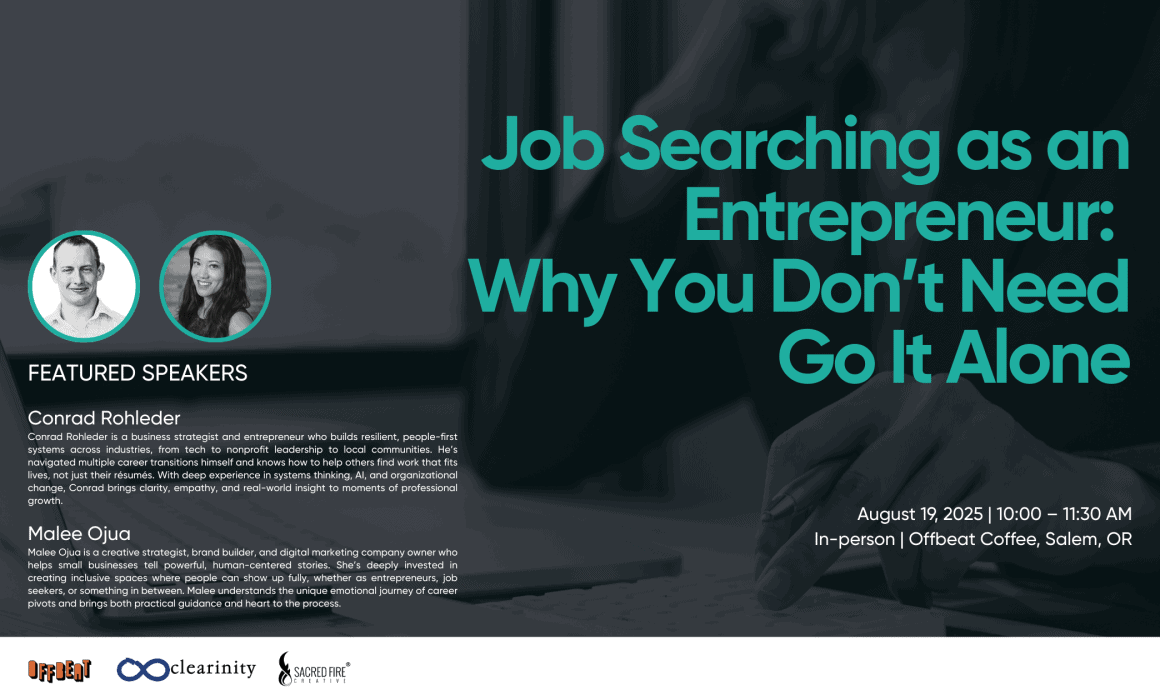Job Searching as an Entrepreneur: Why You Don’t Need Go It Alone
You were prepared for change.
You knew this next chapter wouldn’t be easy.
But nothing quite prepares you for job searching when you’re an entrepreneur.
You thought your biggest challenge would be updating your résumé.
Instead, it’s the quiet, grinding uncertainty that no one warned you about.
The job search isn’t just a search. It’s a test of resilience.
You apply for roles that sound like a fit. You try to explain what you did as a founder without sounding like you’re overqualified – or worse, like you’re starting over after what the interviewer may assume as a failure.
You wonder if the recruiter on the other side understands what it meant to build a brand from nothing, lead a team, manage budgets, grow revenue, solve crises.
You wonder if they can see the value behind the title of “Founder.”
You hit submit and wait. And wait. And wait.
Sometimes there’s a rejection. More often, just silence.
You start to question your instincts.
You rewrite your story. Again.
You try to stay upbeat for the next interview, even as your confidence thins.
And you begin to ask: Is it just me? Am I doing this wrong?
It’s not just you. And you’re not doing it wrong.
Job searching as an entrepreneur is uniquely challenging.
Not because you lack skills, but because traditional hiring systems aren’t built to understand non-traditional paths.
But here’s what no one tells you: You don’t need to muscle through this alone.
You don’t have to.
The missing piece in your job search might not be a better resume or a new strategy.
It might be a support circle, a space where you’re reminded of what you bring to the table, even when the world feels unsure of where to seat you.
What can support circles do for you?
A strong circle doesn’t just offer encouragement. It changes the experience of job searching as an entrepreneur in real, tangible ways.
First, you gain clarity. Talking with others helps you see yourself and your transferable skills more clearly.
You also learn how to tell your story. A support group helps you shape your founder journey into a compelling narrative that hiring managers can understand.
You get unstuck. Whether it’s a new connection, a practical tip, or just someone who’s been there, the right support gives you momentum.
Lastly, you feel human again. Being around others who get it helps you shake off the isolation, the imposter syndrome, and maybe even the shame that job searching can trigger.
You’ve carried enough alone. It’s time to let someone help you.
Finding the right support is what Job Searching for Entrepreneurs is all about. It’s not another job-searching, resume-writing workshop.
It’s a gathering place for people who are in the thick of the search, who’ve been refreshing job boards, second-guessing themselves, and wondering what’s next.
It’s a chance to talk about what really makes a difference: connection, community, and support that actually understands where you’re coming from.
In the upcoming session of this conversation, titled “Finding Support as a Job-Searching Entrepreneur,” we’ll explore:
- What makes the job search uniquely hard for founders
- How to find the right people to walk this path with you
- Where to look for mentorship, guidance, and belonging
- How to ask for help in a way that feels empowering
This session is on August 19, 2025, at Offbeat Coffee in Salem, OR, co-facilitated by Conrad Rohleder of Clearinity and Malee Ojua of Sacred Fire Creative.
The job search is hard.
But you don’t have to do it alone.
And you were never meant to.
Join us for this part of Job Searching for Entrepreneurs.
Let this be the session that reminds you that you’re not stuck.
You’re evolving. And there are people who see what you bring, even when the hiring algorithm doesn’t.
Joining is free. RSVP today.



